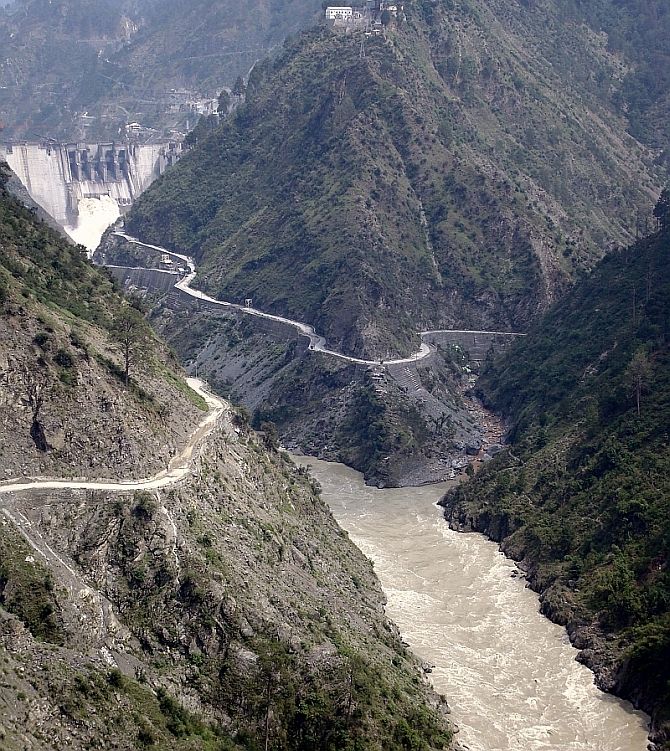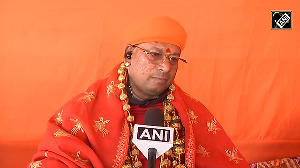'What Modisaab will accomplish by tampering with the treaty is providing ammunition to ultra-nationalist right wing elements within Pakistan who see India as an existential threat.'

In its 56-year existence the India-Pakistan Indus Water Treaty has survived armed conflicts and frosty relations between nuclear-armed neighbours.
The treaty was inked in 1960 by then prime minister Jawaharlal Nehru and then Pakistan president Ayub Khan, which allocates 80 percent of water to Pakistan from the six river Indus Water System, including the Beas, Ravi, Sutlej, Indus, Chenab and Jhelum that flows from India to Pakistan.
Pakistan has often considered the treaty, brokered by the World Bank, to be one sided.
The September 18, 2016 terror attack on the Army Brigade headquarters in Uri, which killed 18 soldiers, has prompted New Delhi to look for ways to hit back at Islamabad. And it found one in the Indus Water Treaty.
Reviewing the treaty with Pakistan on September 26, Prime Minister Narendra Modi is reported to have said that 'blood and water cannot flow at the same time.' It was also decided that New Delhi would expedite the construction of three dams -- Pakul Dul, Sawalkot and Bursar -- on the Chenab river.
To make sense of the impact that New Delhi's call on the Indus treaty will have on Pakistan, Rediff.com's Vipin Vijayan reached out to Dr Daanish Mustafa, senior lecturer at King's College, London, who has deep understanding of Pakistan's river management programmes.
Latest reports coming in seem to suggest that though India will not scrap the Indus Water Treaty, it may decide on greater use of the rivers that supply water to Pakistan. How will this impact Pakistan?
There are three rivers that Pakistan has somewhat exclusive rights to, that flow through India -- the Indus, Jehlum and Chenab.
India has a right according to the treaty to undertake reasonable use of these rivers as long as that use does not adversely affect Pakistan.
India has exclusive rights to the three eastern rivers.
India and Pakistan are not the sole parties, the World Bank is also a party to the treaty.
So if India wants to scrap it, it is going to have to scrap it with the World Bank, which will have consequences beyond just the India-Pakistan dynamic.
In the short run, India's withdrawal from the treaty will have no material impact, because one has to build infrastructure to deny water to Pakistan, which India does not have.
Secondly, on the Jhelum if India wants to build a dam, it will probably have to be in the Uri gorge -- I don't know of any other site for a major dam on that river.
And if you build one there, the lake behind it will probably flood the entire valley of Kashmir.
If India wants to drown the valley that it has fought so hard to retain, just to spite Pakistan, I suppose it could do that.
It could also build dams upstream of Baglihar or in the deep gorges on the Indus, but then where will it use the water?
Of course, if it wants to build gigantic dams on the three rivers, with nowhere to use the water, and a small market for the electricity, at the cost of billions of dollars, it could do that.
But the Pakistani press and security establishment will probably blow a gasket -- and that won't be good for Pakistan or for India either. So the issue is a lot more complicated than just plugging the water supply to Pakistan.
Calls to abrogate the Indus Water Treaty come up almost every time there is a major terror incident. Is it really a trump card in India's pack?
Not really. India has benefitted as much if not more from the Indus Water Treaty -- notice that all the infrastructure on the three eastern rivers was paid for by the World Bank and the international community.
It would be foolish for it to tamper with the treaty that has served it so well all these years.
Will India be justified in either altering the terms of the treaty, or even abrogating it, citing Pakistan's intransigence? Also, what options does Pakistan have to counter this?
The contemporary principles of trans-boundary sharing call for equitable apportionment between upper and lower riparians (the interface between land and a river).
India was fortunate to have the treaty signed when the principle had not been defined.
If it tampers with it -- which it cannot unilaterally -- it can only withdraw from it; it will be inviting the application of that principle to the three eastern rivers in any future negotiations or bargaining.
It would probably not want to open that box for obvious reasons.
Has the Indus Water Treaty offered Pakistan any advantages?
There have been some advantages in terms of the infrastructure development -- the link canals, barrages and two dams.
But it has also inherited ecological collapse of the Ravi and the Sutluj rivers, much to the chagrin of the ethno-nationalist elements in the south of the country that blame the Pakistani military establishment of selling off rivers to India in return for dams and link canals that mostly favour the northern Punjabi heartland.
So the treaty has been a mixed bag for Pakistan as well. I think the weight of evidence in my view suggests that India has benefited more from it, having gotten exclusive control of 3 eastern rivers (which won't happen contemporaneously) where the water demand and the market for it is.
It was also able to play the good guy by giving over three western rivers where it couldn't do much with them anyway because of geography.
Whatever India can do, on the western rivers, which makes any economic sense, it is entitled to do according to the treaty.
I guess what I am saying is that in the view of many in Pakistan, India may just do Pakistan a favour by withdrawing from the treaty, being that the architecture of the treaty and the way it serves the interests of the upper riparian would not be possible if it were renegotiated today.
What role do the Indus commissioners play in keeping the agreement going?
They undertake data sharing and arbitrate any disputes that may arise. They are responsible for the day to day management of the treaty.
How have successive Pakistani governments dealt with the sharing of river waters ?
They don't have to -- it is the job of the commissioners. They have been more busy with inter-provincial and local lever water distribution.
The IWT is a settled law, so there is nothing to be done with it.
How do you forsee the future of the treaty in the aftermath of the latest conflagration?
Modisaab is playing a dangerous game, that will lead to no changes in the treaty because the Indian water establishment knows that they made off like bandits with this treaty.
So biting the nose to spite the face won't be a very sensible approach here.
What Modisaab will accomplish is providing ammunition to ultra-nationalist right wing elements within Pakistan who see India as an existential threat.
You see India doesn't have a monopoly on stupid and evil people -- Pakistan has many of those as well.
IMAGE: The Baglihar hydroelectric power project on the Chenab river at Doda in Jammu and Kashmir. Photograph: Kind courtesy Vinayak.razdan/Wikimedia Commons











 © 2025
© 2025